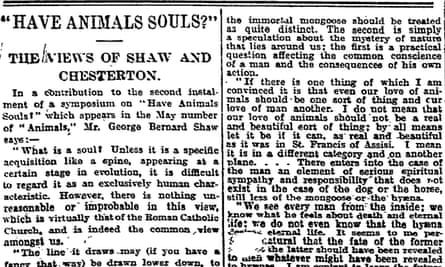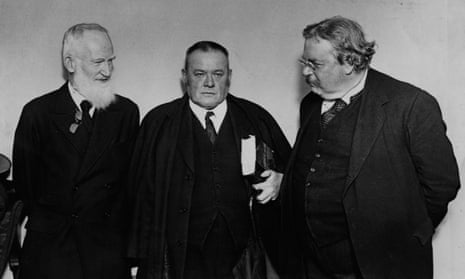In a contribution to the second instalment of a symposium on “Have Animals Souls?” which appears in the May number of “Animals,” Mr. George Bernard Shaw says: –
“What is a soul? Unless it is a specific acquisition like a spine, appearing at a certain stage in evolution, it is difficult to regard it as an exclusively human characteristic. However, there is nothing unreasonable or improbable in this view, which is virtually that of the Roman Catholic Church, and is indeed the common view amongst us.
“The line it draws may (if you have a fancy that way) be drawn lower down, to include dogs or even beetles. Survival after death is another matter altogether. A man may believe that he has a soul, and that a dog has a soul, without believing anything so monstrous as that he and the dog as individuals are going to live for ever.”
Mr G.K. Chesterton after stating frankly that the subject is one of the many questions on which he is content to be an agnostic, says: – “About one thing I am quite clear, that it is perfectly right that the two ideas of the immortal man and the immortal mongoose should be treated as quite distinct. The second is simply a speculation about the mystery of nature that lies around us; the first is a practical question affecting the common conscience of a man and the consequences of his own action.
“If there is one thing of which I am convinced it is that even our love of animals should be one sort of thing and our love of man another. I do not mean that our love of animals should not be a real and beautiful sort of thing; by all means let it be if it can, as real and beautiful as it was in St. Francis of Assisi. I mean it is in a different category and on another plane... There enters into the case of the man an element of serious spiritual sympathy and responsibility that does not exist in the case of the dog or the horse, still less of the mongoose or the hyaena.
“We see every man from the inside; we know what he feels about death and eternal life; we do not even know that the hyena desires eternal life. It seems to me perfectly natural that the fate of the former and not the latter should have been revealed to men whatever might have been revealed to hyenas. I am content to leave the future of creatures so mysterious to their Maker, whom I believe to have made all things in mercy; in other words, I have considerably more hope for animals than most modern people have had for men.”
Bishop Welldon [Dean of Durham Cathedral] says the belief that the souls of animals as well as of men survive death has been held by a good many profound thinkers, from Plato to Bishop Butler, and adds: “I incline to think that animal life will prove to be susceptible not only of continuance but of elevation beyond the grave.”


Comments (…)
Sign in or create your Guardian account to join the discussion